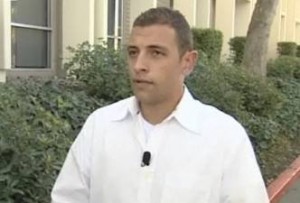On Wednesday the Council on American Islamic Relations sued the FBI on behalf of Yasir Afifi, a 20-year-old Muslim American student at Mission College in Santa Clara, who last fall found an FBI tracking device under his car. (Full text of the lawsuit here.) The device was discovered by a mechanic during an oil change, at which point Afifi posted a photo on the Web seeking to identify it. Soon after, the FBI paid him a visit. The San Jose Mercury News reports Afifi’s account of what happened next:
A couple of days after he posted the photo, Afifi said FBI agents pulled him over to question him about his license. One agent identified himself only as Vincent, the suit alleges. The agents asked about the tracking device and said if he didn’t turn it over, he’d face charges for possessing federal property. Vincent said he had a warrant to retrieve the device, but refused to show it to Afifi, the suit states.
Afifi said he wanted to contact an attorney, who would make the “appropriate arrangements” with the FBI, but then “Vincent began yelling at Mr. Afifi and emphatically refused Mr. Afifi’s request,” according to the suit.
Here’s a KGO interview with Afifi from Oct 8
Yesterday, KQED’s Amy Standen interviewed Zahra Billoo, the Executive Director of the San Francisco branch of the Council for American-Islamic Relations. Billoo said that after the Afifi story broke last year, her group filed a Freedom of Information Act request on the case, which was quickly followed by another request from the FBI to meet with Afifi. She said the lawsuit seeks to prevent the FBI from surveilling or interrogating him.
